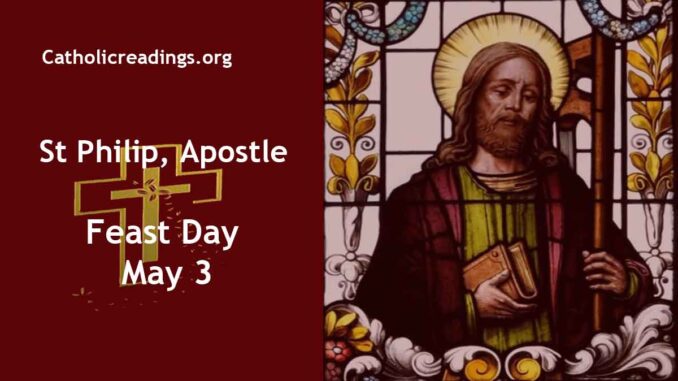St. Philip the Apostle was an apostle of Jesus Christ, born in Bethsaida of Galilee.
Initially, he was a disciple of John the Baptist. He is the apostle who preached in Greece, Syria, and Phrygia.
He died in 80 AD in Hierapolis, (modern-day Pamukkale, Denizli, Turkey).
Feast Day is celebrated on May 3 every year alongside that of St James the Lesser.
| St Philip, Apostle Biography | |
|---|---|
 St Philip the Apostle – Feast Day – May 3 2026 | |
| Place of Birth | Bethsaida of Galilee |
| Profession | Apostle of Jesus Christ |
| Place of Work | Greece, Syria, and Phrygia |
| Date of Death | 80 AD |
| Place of Death | Hierapolis, (modern-day Pamukkale, Denizli, Turkey) |
| Feast Day | May 3 |
| Canonization | Pre-Congregation |
| Patron Saint of |
|
St Philip the Apostle Biography
According to the New Testament, St. Philip was one of the Twelve Apostles of Jesus Christ, born in Bethsaida of Galilee.
Additional Christian traditions suggest that he was the apostle who preached in Greece, Syria, and Phrygia.
Philip the Apostle, who was one of the twelve apostles of Jesus, is not to be mistaken for Philip the Evangelist, who was appointed alongside Stephen to supervise charitable distributions, as documented in the Acts of the Apostles 6:5.
St. Philip the Apostle was present with John the Baptist when he identified Jesus as the Lamb of God. He was the one who initially introduced Jesus to Nathanael (also known as Bartholomew). Philip was also present at the wedding feast in Cana.
Philip was involved in the miracle where Jesus fed a large crowd with only five loaves of bread and two fish (John 6:5-9).
5 When Jesus raised his eyes and saw that a large crowd was coming to him, he said to Philip, “Where can we buy enough food for them to eat?”
John 6:5-9
6 He said this to test him, because he himself knew what he was going to do.
7 Philip answered him, “Two hundred days’ wages worth of food would not be enough for each of them to have a little [bit].”
St. Philip later became a bridge to the Greek community, as he himself had a Greek name and may have been familiar with Greek culture and language. It is possible that Greek pilgrims in Jerusalem knew him.
He is mentioned in the New Testament as the one who informed Andrew that some Greeks wanted to meet Jesus, and they both conveyed this message to Jesus. (John 12:21)
At the Last Supper, Philip asked Jesus to reveal the Father to them, giving Jesus a chance to explain to his disciples about the oneness of the Father and the Son.
The story of Philip’s martyrdom in Hierapolis recounts that he healed and preached to the wife of the city’s proconsul, which led to the proconsul becoming angry and ordering the torture of Philip, Bartholomew, and Mariamne.
Eventually, Philip and Bartholomew were crucified upside-down, and while on the cross, Philip continued to preach.
The crowd was moved by his words, and they released Bartholomew from his cross. However, Philip refused to be released and remained on the cross until his death.
The remains of Philip the Apostle are presently located in the crypt of Basilica Santi Apostoli in Rome.
Related Links
Powered By SEO Experts
Follow @ReadingCatholic
